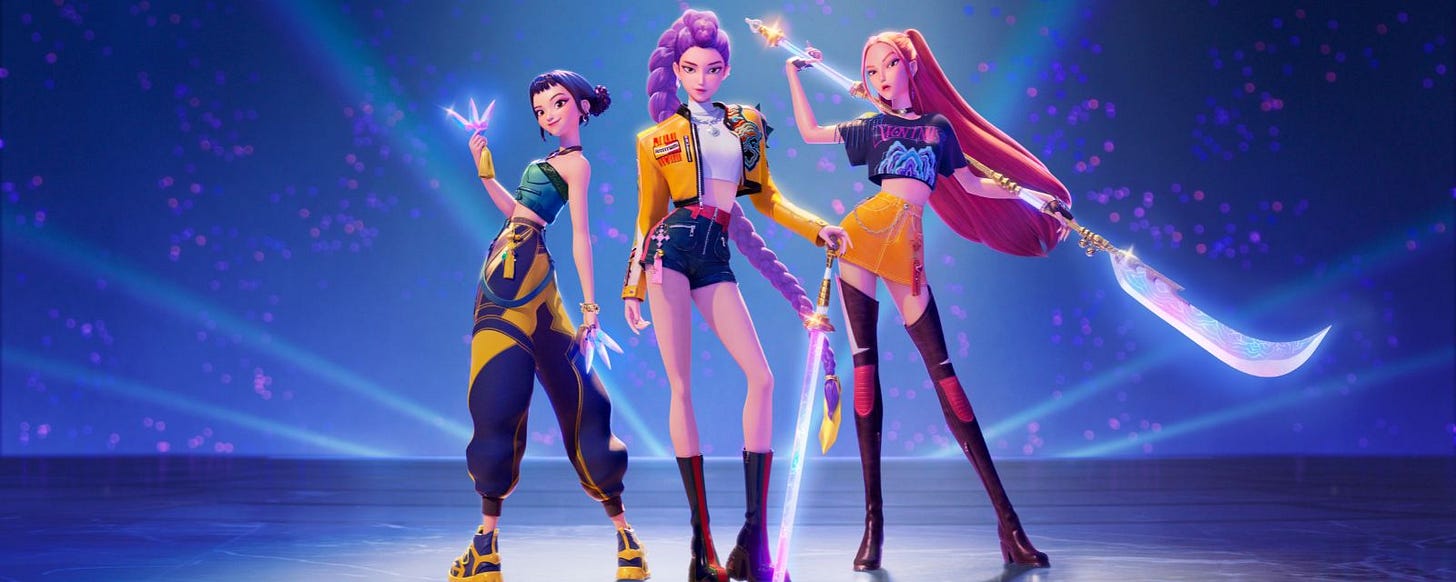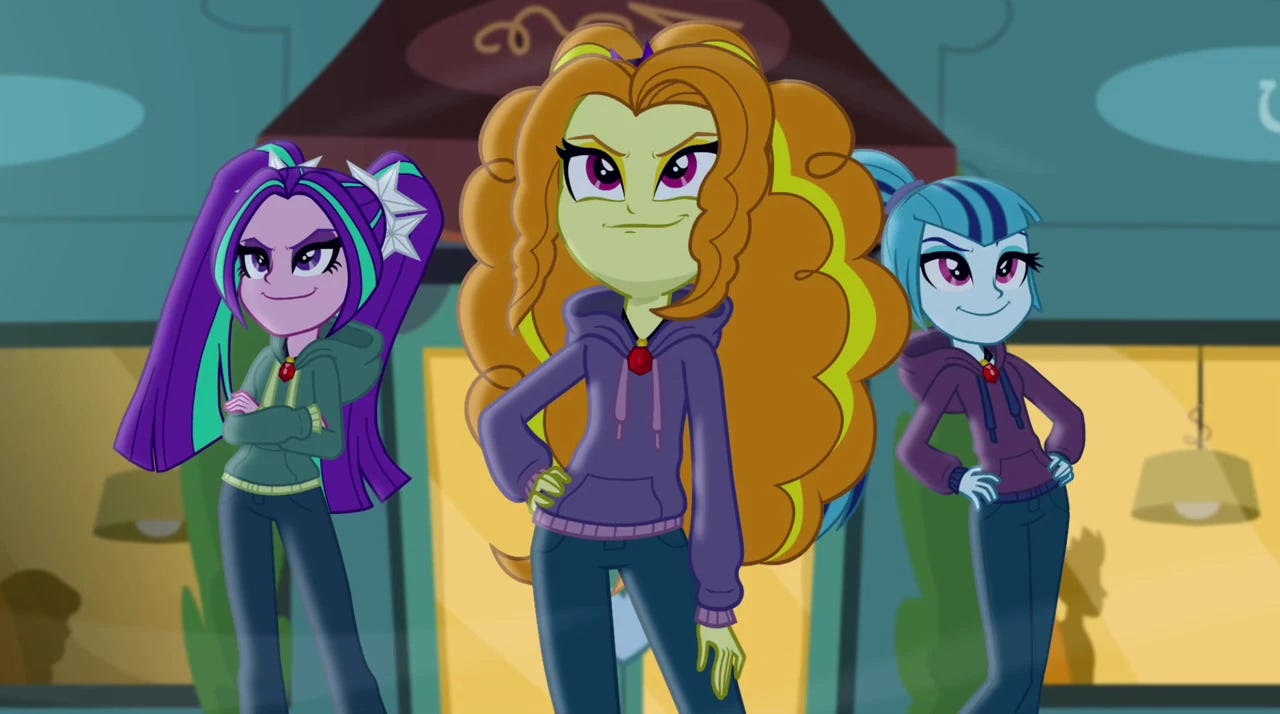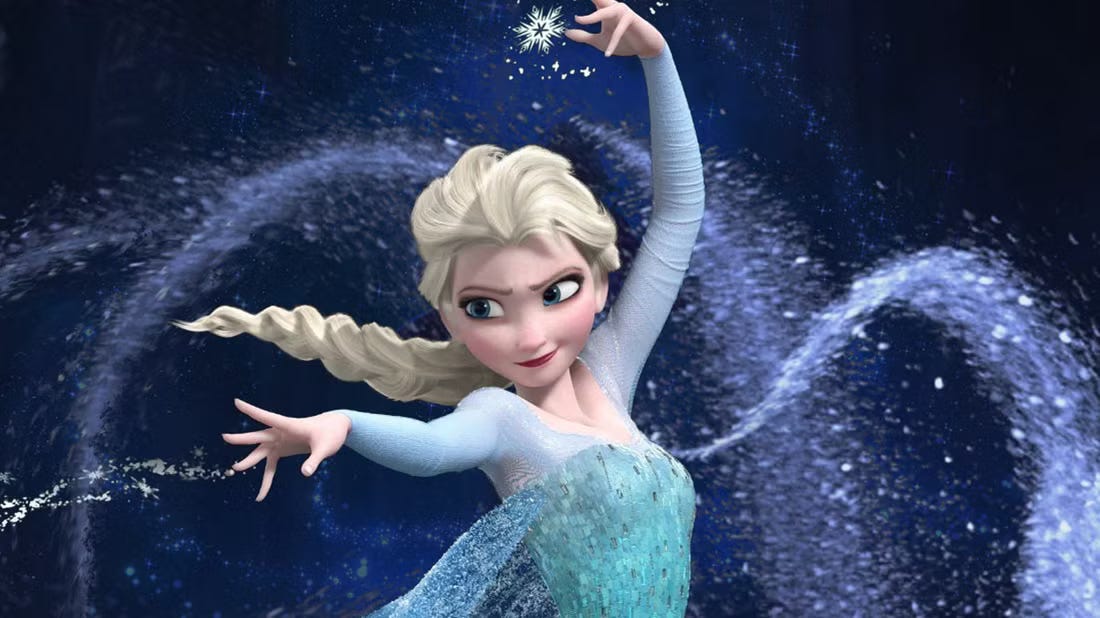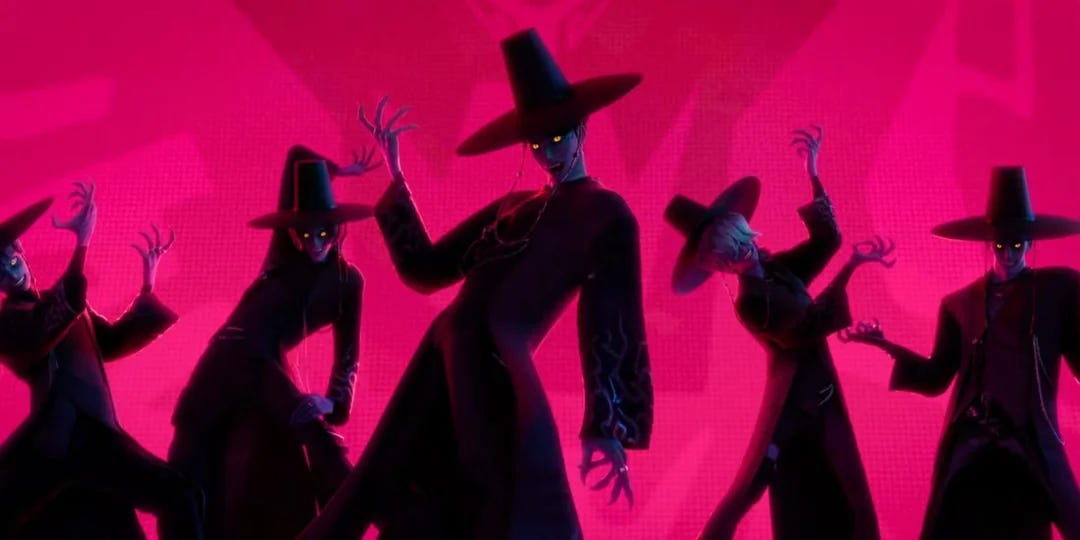KPop Demon Hunters is Not Like Frozen
And the dangers of desiring the wrong thing.
Tell me if you’ve heard of this one before.
In this animated movie, a group of demons enthralls people with music, feeding on their adoration and instigating conflict so they can conquer the world. The music of these demons must be combated with music, and so a band of friends must unite their voices and sing like the fate of the world depends upon their performance.
Because the fate of the world does depend on their performance.
In the final showdown, there is no more subtext, and the lyrics of the demon’s song are openly hostile and obvious about their desire for domination. But no one cares. The audience is already enthralled. It’s too late.
Or is it? After fighting with each other and breaking the band apart, the group of friends comes back together for the finale and defeats the demons with the power of friendship and song.
I’m writing, of course, My Little Pony: Equestria Girls: Rainbow Rocks, the hit sequel to the successful spin-off of the My Little Pony: Friendship Is Magic television series. A movie so fabulous and derivative that it requires two subtitles.
Oh, you don’t know about this movie?
You must not have had a 6-year-old girl in the mid-2010s.
But of course, I’m also talking about KPop Demon Hunters, because who isn’t? It’s the most popular Netflix movie of all time, has a chart-topping song and album, and is wrapping up a successful theatrical run. With this notoriety comes comparisons.
These similarities, however, don’t mean it’s a lesser movie. Plots and archetypes are reused. Ideas evolve and are improved upon. Execution and craft can spin gold out of a dumb idea.
These comparisons, especially the comparisons to Frozen—another popular animated film with a chart-topping soundtrack—miss something important. Mostly, they miss the part where Frozen is just bad, but also make some terrible assumptions about KPop Demon Hunters.
The Surface-Level Similarities
Let’s do the same exercise I did at the beginning, except with less tongue in my cheek. I’ll describe KPop Demon Hunters in a way that makes it easy to assume I’m talking about Frozen.
An animated musical where a girl hides a true part of herself from her friends because she’s afraid they will think she’s a monster. To her, it’s a curse. Her mother reinforces this view. Once the secret is revealed, she runs off, endangering everything she once held dear. Only when she comes back, learns to accept herself, and realizes her friends and family accept her, can she defeat the villains and push back the danger to those she loves.
To break it down:
Both protagonists have a hidden curse that their parents, real or adoptive, demand they keep secret.
The curse is revealed, leading to fallout and disaster.
The curse is finally accepted as part of the protagonist’s true self. The kingdom (world) is saved.
It’s a story about acceptance and love. Maybe even a gay “coming out” allegory.
Clean and tidy.
Except this doesn’t really describe KPop Demon Hunters at all. Someone has looked at the facades of two houses on the street and determined they have the same architecture. But one is only painted to look like brick, and behind the facade, it’s not really a house, but a jury-rigged contraption of 2x4s, bent nails, and wood glue. It’s a temporary party decoration at best, not a livable dwelling.
Let’s take a further tour.
The Curse
In KPop, it’s revealed that Rumi, the main protagonist, is part demon. As a result, she has demon patterns on her body that she has kept hidden all of her life. The patterns keep growing until they become impossible to hide.
In Frozen, Elsa has awesome magical powers, allowing her to control ice and snow.
Obviously, one of these things isn’t really a curse. Elsa’s powers are a gift. The conflict is caused by a lack of control and fear, not the gift itself. And some really terrible parents who never taught her to properly harness the power. There is nothing inherently evil about it.
But Rumi’s patterns and pedigree are curses, especially since her profession is demon hunting. They offer no advantages. In the movie, demons are things to be killed. Period. It is a curse, top-to-bottom, and at no point does Rumi need to harness her demon powers to save the day. Nothing good can come from it.
So is Rumi cursed for all time? Irredeemable?
That is the central question.
Climax and Resolution
Frozen ends with Anna sacrificing herself for her sister, then has some handwavy spiel about love, and all of a sudden, Elsa knows how to use her powers safely. She has accepted her “curse,” which was awesome all along, because of course it was. Ice powers are cool.
KPop ends with Rumi confessing her shame and admitting that she can’t save herself.
The ruler of all demons, Gwi-ma, says, “You think you can fix the world? You can’t even fix yourself.”
Rumi answers, “I can’t.”
The song that follows begins with the lyrics, “Nothing but the truth now…” and then confesses her sins in front of her friends.
Another lyric: “I should have let the jagged edges meet the light instead.” The song is part confession, bringing out things that should be exposed to the light.
“So we were cowards. So we were liars. So we’re not heroes.”
And then they kill a bunch of demons. In the scene before the close of the movie, Rumi’s patterns have begun to fade. Confession paired with sorrow is, indeed, the only proper way to deal with hidden shame.
The world wants people to be proud of their shame. To polish it off, wear it like a nose ring for all to see, sear their conscience so they become numb to it, and then snarl at anyone who dares suggest it is something to be ashamed of. Hidden shame and open pride are two ways that evil enslaves people.
And it’s how the head demon in the movie controls his minions and fills his ranks with new minions.
On Villains, Desire, And Shifting Loyalties
The villains in Frozen are fuzzy and lame, and the movie has to do some narrative sleight of hand to make them work. Barely. It wants the villains to be concepts like self-loathing, fear, misunderstanding, and naivety. It’s as unfocused as a dog on shrooms hallucinating an army of squirrels.
Elsa must accept herself. Anna shouldn’t have fallen for Hans. The funny-looking Duke shouldn’t be so quick to judge. Hans acts heroically in places, playing the part of the traditional hero we would expect, but the movie subverts our expectations. Silly us. We shouldn’t have been as naive as Anna. Traditional heroes don’t exist anymore.
The villains in KPop, however, are evil. Demons are to be killed because they are evil. They are not misunderstood creatures. But the movie also gets the head demon, Gwi-ma, right. His main weapon is accusation, which he uses to nurture shame and guilt. We hear several of these accusations, and they sound plausible and realistic.
Sound familiar?
Satan is the great accuser.
And I heard a loud voice in heaven, saying, “Now the salvation and the power and the kingdom of our God and the authority of his Christ have come, for the accuser of our brothers has been thrown down, who accuses them day and night before our God.
Revelation 12:10
I’m not sure how this got into the movie and became such a critical part of its architecture. There’s some chatter online about it being the Korean word for devil/satan spelled backwards, Ma-gwi. If so, it was clearly intentional and an unexpected touch. It’s no Screwtape Letters, but it does accurately portray how the devil sometimes operates, something I wouldn’t expect from a modern animated musical. The solution to his attacks, a full-throated confession, is equally insightful.
We also see how evil is seductive and uses misplaced loyalty to lure people to their doom. The Saja boys, in their final concert, are no longer disguised. They unveil their true demon form, singing, “You gave me your heart, now I’m here for your soul. I’m the only one who will love your sins. You’re down on your knees, I’ma be your idol.”
What we desire is a matter of life and death. In its cartoonish juxtaposition of two bands dueling for the hearts of fans, KPop Demon Hunters presents the real dangers of giving your heart to the wrong thing. How quickly love can become obsession and worship.
And how easy it is to get loyalty to transfer from one thing to another if they share a category or have similar accoutrements. Unexamined loyalty can be exploited. The unscrupulous try to exploit it all the time. Why do you think Disney bought Star Wars? Why did Amazon create Rings of Power? Why did DC make Superman bisexual in the comics? Why do beloved brands get hollowed out, worn like a skin suit, and drafted into the culture war? Because of built-in loyalty. Sure, some will bail. But some will follow. Into darkness.
The Saja Boys portray a very real phenomenon. Fortunately, modern manifestations of this evil have no regulating principle. It will almost always unmask itself too early. In the movie, the transition to “Bow down, I’m you’re idol” happens gradually and with nuance. In the real world, evil often tries to rush straight to the idol stage, spray-painting itself gold and streaking across the field on live television, screaming obscenities, demanding respect and worship.
We are in the later stages of what C.S. Lewis describes in That Hideous Strength:
Good is always getting better and bad is always getting worse: the possibilities of even apparent neutrality are always diminishing.
For that, we should be grateful. It wasn’t always this way, however.
Sometimes, evil remains subtle and deceptive. Television began as mostly wholesome entertainment. There were strict standards. Once the culture became loyal to the small screen and the watching habit was ingrained in the populace, television shifted. We didn’t go from I Love Lucy to sodomites sticking their tongues down each other’s throats overnight.
KPop Demon Hunters does a great job of depicting this phenomenon, while giving some much-deserved critique to K-pop fandom.
But what about Jinu, the lead singer of the demon boy band?
While some might complain that Jinu, the lead singer of the demon boy band, has a redemption arc, it’s not as clear-cut as that. While I grant that it’s the weakest part of the movie, he is still not a misunderstood villain. The movie makes it very clear that he is evil. By his own admission, he abandoned his entire family in exchange for temporary riches and comfort. He, too, confesses and then sacrifices himself once he sees Rumi free from her own shame.
But in the end, Jinu still has to die, just like the other demons. There is no true redemption, though there is some handwavey stuff about his soul. He still had a soul? And it can turn into a weapon now? The movie gets a bit confused at this point, but it’s in the middle of the final anthem and charges on toward a satisfying ending.
They might ruin all of this in the inevitable sequel, but for now, Jinu is dead and gone.
Not Perfect, but Good
Like all movies, you should watch this one with discernment. Nothing we watch should be drunk to the dregs in a single, careless gulp. But it is a much healthier movie than, say, The Little Mermaid.
There are multiple discussion points to have with your kids while you watch. Sift through the lies. Polish off the truth.
And the truth this movie attempts to tell shines bright, indeed.







I loved this analysis and comparison. Thanks for putting it out there!
The things that made folk and fairytales popular still hold, and while people still can get led astray by hollow form, is that not because they yearn for the echo of Eden, to see the love of the princess' tears coat the blade of hero, for hero to slay the dragon?
To see the human sacrifice that ends all human sacrifice.
Frozen only had one decent song anyway, just that one at the start about ice and labour.